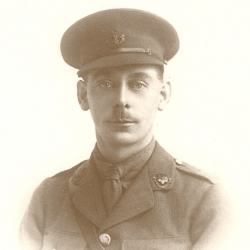Harold Harrison Knight was born in Ashton under Lyne on December 13, 1891. His father, John Wallwork Knight was a cotton wool broker and mill furnisher with business address in Cavendish Street, Ashton. He was educated at William Hulme’s Grammar School, Manchester (1902-1907). By 1911, Harold was working as an assistant in his father’s business and living with his parents and older sister, (Winifred), and a domestic servant on Henrietta Street in Ashton. During this time, he joined the Ashton Golf Club and was one of several 9th Battalion Manchester Regiment officers who were members of the club.
Shortly after the outbreak of war he was appointed as a Second Lieutenant in the 9th Battalion Manchester Regiment (Territorial Force), along with 10 others, on October 12, 1914. Harold joined the 2/9th at training in Southport and moved with them to Pease Pottage in June 1915. A month prior to receiving his commission he was the best man to Lt. Alfred Gordon Birchenall (9th Battalion Manchester Regiment) in his marriage to Harold’s sister Winifred, Lt. Birchenall being unable to travel to Egypt with the Battalion due to illness.
On August 2, 1915 2/Lt. Harold Harrison Knight embarked on His Majesty’s Transport Ship Arcadian along with 3 other Officers and 145 other ranks en-route to Mudros where they arrived on August 19th and joined the Battalion at Cape Helles on August 22nd. Less than two weeks later he was admitted to the 1/3rd East Lancs Field Hospital suffering from dysentery and was invalided to the UK on September 3, 1915 on the hospital ship Delta. He arrived at Southampton on September 15th where he spent some time in hospital in London and convalesced in Wales before returning home to Ashton in late November.
By December 1915 he was fully recovered from Dysentery but still too weak and underweight for active service. He was passed fit for home service in January 1916 rejoining the the 2/9th Manchesters who were at camp in Codford. He was passed fit for active service a month later but remained with the 2/9th as they moved to camp at Witley, in Surrey. On June 12, 1916 he was again best man at the wedding of a brother Officer, this time for Lt. William Marsden Barratt. He rejoined the 1/9th Battalion in Egypt on November 8, 1916 traveling with 69 other ranks. He was promoted to Lieutenant on June 1, 1916 otherwise his time in Egypt was uneventful, only attending a 3 week course of instruction in Cairo in January 1917.
He sailed with the Battalion to France, arriving March 11, 1917 and two months later spent 11 days sick in hospital. Shortly after his return to the Battalion he was appointed Town Major for 7 weeks. He then took home leave in the UK for 11 days, leaving on July 27, 1917. On August 27 he was attached to the 42nd Division and remained attached for just over a month. He took another home leave pm December 7, 1917, this time for two weeks and upon his return was attached to the 126th Infantry Brigade Headquarters for two weeks.
In February 1918 the army was about to go through a dramatic reconstruction with Brigades being reduced from 4 to 3 Battalions. On February 21, 1918 Lt. Harold Harrison Knight was posted to the 1/6th Battalion Manchester Regiment. On March 27, 1918 the 1/6th Manchesters were close to Ablainzevelle, South of Arras. They came under repeated attack by German forces and although the attacks were repulsed, they suffered heavy casualties from shell fire. 15 other ranks were killed or reported missing and 65 wounded. While two Officers were wounded and one killed. The Officer killed was Lt. Knight.
Lt. Harold Harrison Knight was killed in action on March 27, 1918 and is buried in the Douchy-Les-Ayette British Cemetary and is commemorated on the Albion United Reformed Church War Memorial and the Ashton under Lyne Civic War Memorial. He was 26 years old.

